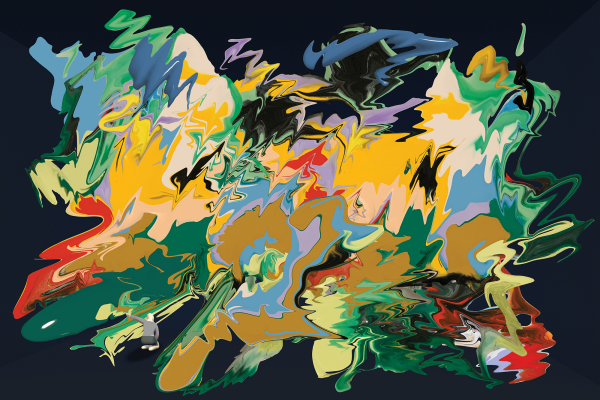OFTEN, WITH MEDITATION, I’m reminded of many people’s reaction to poetry. “I don’t get it,” they say, a little embarrassed to be admitting this to a writer and a former English teacher.
The first thing I think is: You must have had a really lousy teacher who taught you that poetry is something you “get”—a message you extract for a good grade. Poetry-phobes might feel a bit more relaxed when I tell them that’s not how poetry works. Often, with my favorite poems, I never fully get them. All I know is that reading and rereading them, the mystery stirs inside me again. In her lovely poem “Self-Portrait with Religion and Poetry,” Kate Daniels describes what happens to her when she deeply connects with a work of art:
... I lie down in the silence
of my mind and touch the world all over.
Clouds fly through me. Trees break the sky
above a frozen lake, and a footprint
startles its crust of snow.
Then I can type another page, or nurse
my hungry infant. I can take from the cupboard
the bread and the wine, the eggplant and garlic
my hands will transform into sustenance.
Like poetry-phobes, I’m a bit of a meditation-phobe. Even after years of daily practice, I feel like a total failure. Within seconds of hearing the bell, my mind is overrun by thoughts, plans, insights, schedules, shopping lists (eggplant, garlic, bread, wine).
I recently heard a story that has helped me relax about my meditation practice. An elderly nun attended a retreat on centering prayer (the Christian term for meditation). After two days, she tearfully confessed that her mind must have strayed a thousand times. The meditation leader beamed. “Wonderful! A thousand opportunities to return to God!”
Hearing that story, I was reminded of the parable of the prodigal son and the joy the father experiences when the young man returns home. Now multiply that by a thousand times—that’s a lot of joy!
Another helpful tip for wayward meditators (is there any other kind?) is to imagine yourself as an old grandmother or grandfather minding the grandkids and their little friends. They run around like crazy, jumping, laughing, falling down, bawling, fighting, hugging each other. Oh my, such exuberance! You’re exhausted just watching them. But your part is not to throw yourself into that fray. You’ve gone past that stage of life. They are doing what children do. And you are doing what old, tired souls do: watching, stepping in if needed, mostly just being a kind, attentive, and nonjudgmental presence in their world.
So also when you meditate. You are minding that noisy gaggle running around in your head. Not getting pulled into their arguments, siding with their alliances, indulging their tantrums. That’s all you have to “do,” all you have to “get” about meditation.
You don’t even have to be good at it. Grandma sometimes nods off. Some days she’s cranky or impatient. But her bedrock love for these little critters comes through even on those bad gray-hair days. “You do not have to be good,” Mary Oliver reminds us in her poem, “Wild Geese.” It’s as simple as letting “the soft animal of your body/love what it loves.”
A young friend recently told me he has the best grandmother in the world. Thinking I’d get some tips on being a terrific grandmother too (There I go again!), I asked what made her the best. His ready answer, “She always says yes.”
That’s a great approach to meditating, and to life in general, if we understand our lives as an extended meditation practice and ongoing prayer. Rumi, the 13th century Persian poet and mystic, reminds us of this in his poem “The Guest House” (translated by Coleman Barks):
This being human is a guest house.
Every morning a new arrival.
A joy, a depression, a meanness,
some momentary awareness comes
as an unexpected visitor.
Welcome and entertain them all!
Even if they’re a crowd of sorrows,
who violently sweep your house
empty of its furniture,
still, treat each guest honorably.
He may be clearing you out
for some new delight.
The dark thought, the shame, the malice,
meet them at the door laughing,
and invite them in.
Be grateful for whoever comes,
because each has been sent
as a guide from beyond.
This isn’t always possible, I know. I confess I often say No! I don’t have the energy, I’m busy writing; I’m resting; I already gave to the last uninvited guest; it’s not a convenient time. (The much longer version of this list is available in my meditating mind.) But what I’ve found is that resisting takes up a heck of a lot more time, energy, good will, and peace of mind than letting the unwelcomed feelings, thoughts, and distractions come and go. It turns out they aren’t all that interested in me. Don’t take your feelings personally, a Quaker in our meditation group advised at one of our sessions.
During a rough period of my life, I kept having a recurrent nightmare. A monster was chasing after me. Breathless and panicked, I ran home, locked myself in, and piled every available piece of furniture at the door. Finally, the monster took the hint and wandered off. Or so I thought. But when I turned around, relieved, there it was: It wasn’t a monster, but a mirror, reflecting my face.
As with poetry and meditation, I’m not sure I totally “get” my dreams. But I get the hint: Acceptance changes the paradigm, defuses the struggle, humanizes the fear. Ruby Sales, the African American activist and founder of SpiritHouse Project, once remarked that when she finds herself in a furious, escalating encounter where sides are being taken and folks are demonizing, “us”-ing and “them”-ing each other, her first question is, “Where does it hurt?” It doesn’t end the struggle, but it begins to transform it. The no and the yes can reach a further shore, a larger paradigm. History and hope sometimes do rhyme. And—to bring in yet another poet, William Blake—both wear the human face divine.
So, feel encouraged. Welcome whatever comes to the doors of your attention when you meditate. No need to give up, abandon the house or put up a struggle or call the superego cops. Finally, these distractions are guests, not permanent residents. (At the end of their play day, the grandkids go home.) These visitors might just be clearing space for the mystery already stirring inside you.

Got something to say about what you're reading? We value your feedback!







